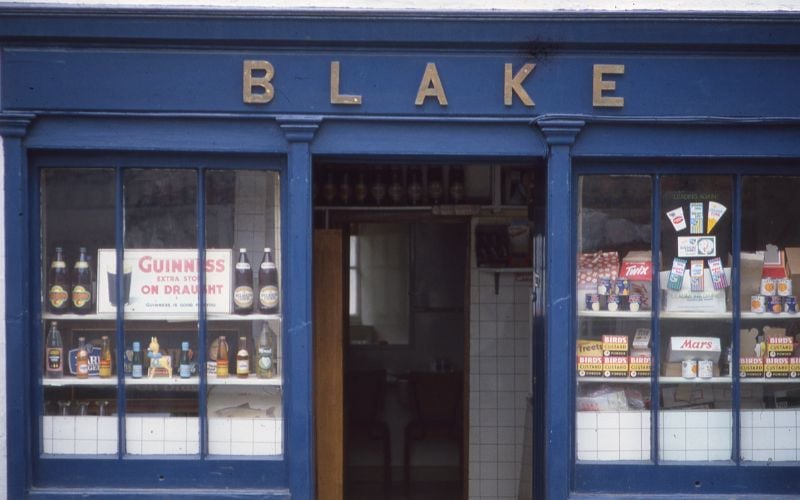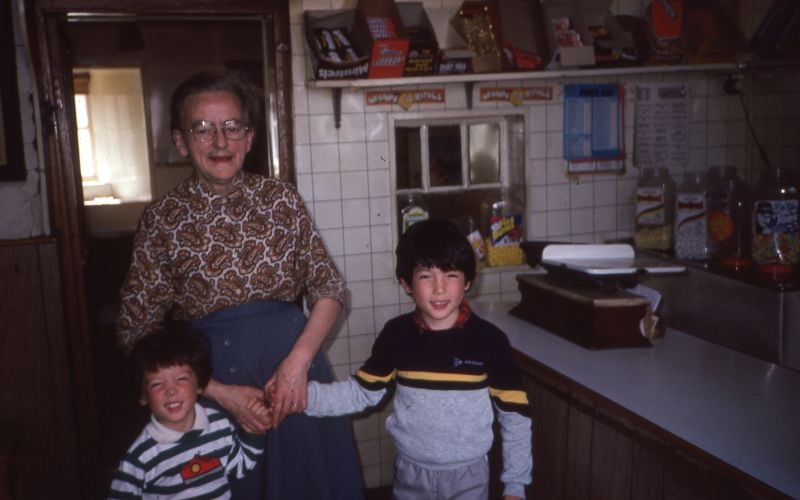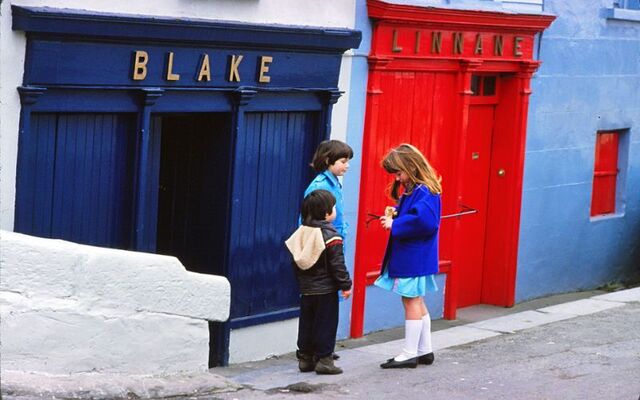April 1987: In the market town of Ennistymon, Co Clare, there stands a blue and gold, 200-year-old public house belonging to Mary Blake.
For the past 40 years, Mary has stood behind one of its two wooden counters: the left counter where local farmers enjoy their evening “bugles” of stout and ale, and the right counter where a flock of noon-day schoolchildren crowd the small shop to buy an assortment of fizzle sticks, pink squirrels, and toffee logs.
Mary Blake is the undisputed queen of the penny-candy confectioners, having brown-bagged over the long years such delectables as sailor’s chews, brown cushions, gob stoppers, pig’s teats, licorice sticks, acid drops, jelly tots, and patsie pops.
On this sunny day in late April, following the Lenten Fast, I count 110 boys and girls, ages 12 to 17, enter Blake’s and line up in a U-shaped queue in the cramped space between counters, which is slightly larger than a ping-pong table.
The head of the line is crushed and granulated against the candy counter; the epicenter buckles for relief, and the tail snakes out the door, up the steps, and breaks away into loose knots across the seven-arched bridge that spans the peat-frothed cascades of the River Inagh.
It is spring in Ennistymon. Bluebells and primroses are gathered along the river’s banks to brighten the windows of this slate-gray town. The elegant white Georgian hotel—The Falls—standing between the river and rookery, was the childhood home of Caitlin MacNamara Thomas, who married the Welsh poet, Dylan Thomas.
Below the post office, the dull ring of hammer to anvil can be heard amidst the black soot and sparking bellows of the forge. It is said the blacksmith there has a cure for warts.
There is no hurry on this sun-filled day. Patsy Dwyer, the local storyteller, tells anyone who cares to listen how he once spotted a school of mermaids swimming downstream and out beyond the offing of the blackest sea “to seek romance and mackerel.”
The cuckoo, that tireless supporter of surrogate motherhood, can be heard in the wood of the old nunnery. The flowering cherry is blooming in its fleeting pride. Even an ancient Stoic would pause and draw his breath on such a splendid day.

Blake's shop front in Ennistymon, Co Clare. (Kevin O'Hara)
Entering Mary Blake’s, I sit inside the left-hand counter, out of harm’s way, as the bottle-green skirts of the Convent of Mercy converge with the cranberry sweaters of the Christian Brothers. These students behave remarkably well despite their segregated classes and the distilling of spring in their wakening senses. What a tragic age, I muse with half-envy, as I recall the lines of Brian Merriman, the 18th-century Clare poet, “The wealth of life is in bondage fetters.”
There, they fidgeted in the pangs of adolescence while the continual sing-song for sweets can be heard over their growing pains.
“Three traffic signs.”
“Three pence,” answered Mary.
“Four cola bottles.”
“Three and four are seven.”
“Two hedgehogs.”
“Seven and two are nine.”
“Three fizz.”
“Twelve.”
“Two golf balls.”
“Twelve and two . . . fourteen.”
“Three black jacks.”
“Seventeen, now.”
“And three refreshers.”
“Twenty.”
The chant for candy might have become a mantra if not for Mary’s fiery outbursts that are brought on by “lanky louts” who are overheard using foul language on their green-skirted victims. Such villains are quickly given their walking papers and won’t be allowed back in the shop until an apology is accepted by Mary at the door. Most scathings, however, take place at the candy counter itself, where a customer might dally in his or her selection, toy with the weighing scales, or “go showboating” and “jig-acting” to entertain one’s cronies.
“You’re in dreamland now,” snaps Mary.
“What are you after?”
“Will you stop with your up and downing like a yo-yo!”
“Arragh, hurry on, will ya!”
“Are you shopping or no?”
“Sixteen!”
“Well, aren’t you the bees-knees with your 10-pound note. And do you think I’ll go changing it for a few coppers of sweets?”
“Get out with your penny, and your penny tomorrow and the next. Are you saving me bags for marbles?”

Brendan and Eamonn O’Hara with Mary Blake. (Kevin O'Hara)
The bells of the technical school are heard throughout the town as Mary is pummeled with last-minute orders for mini-eggs, conversations, aniseed balls, bullets, bon-bons, and white mice. The last student gallops from the shop hopelessly late, leaving Mary panting in front of her countless candy jars.
Resting a moment, Mary walks over to me and fills my glass with a bottle of Harp. Then, excusing herself, she goes into the back kitchen where she prepares her afternoon tea on an old Stanley range.
Calling out to me, she says, “Now, can’t you tell all your friends in America how you once witnessed an old woman being murdered and saved by the sight of a penny.”
*Kevin O’Hara is the author of “Last of the Donkey Pilgrims: A Man’s Journey through Ireland.” You can visit his website, TheDonkeyman.com. This story was first published in The Berkshire Eagle, Pittsfield, MA on May 15th, 1987.




Comments